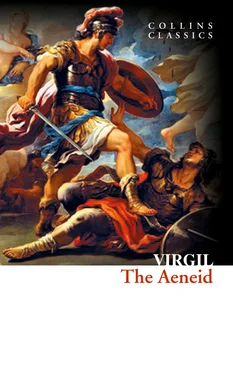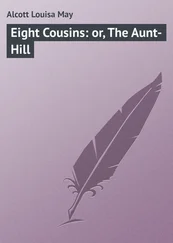Orontes’ bark, that bore the Lycian crew,
(A horrid sight!) ev’n in the hero’s view,
From stem to stern by waves was overborne:
The trembling pilot, from his rudder torn,
Was headlong hurl’d; thrice round the ship was toss’d,
Then bulg’d at once, and in the deep was lost;
And here and there above the waves were seen
Arms, pictures, precious goods, and floating men.
The stoutest vessel to the storm gave way,
And suck’d thro’ loosen’d planks the rushing sea.
Ilioneus was her chief: Alethes old,
Achates faithful, Abas young and bold,
Endur’d not less; their ships, with gaping seams,
Admit the deluge of the briny streams.
Meantime imperial Neptune heard the sound
Of raging billows breaking on the ground.
Displeas’d, and fearing for his wat’ry reign,
He rear’d his awful head above the main,
Serene in majesty; then roll’d his eyes
Around the space of earth, and seas, and skies.
He saw the Trojan fleet dispers’d, distress’d,
By stormy winds and wintry heav’n oppress’d.
Full well the god his sister’s envy knew,
And what her aims and what her arts pursue.
He summon’d Eurus and the western blast,
And first an angry glance on both he cast;
Then thus rebuk’d: “Audacious winds! from whence
This bold attempt, this rebel insolence?
Is it for you to ravage seas and land,
Unauthoriz’d by my supreme command?
To raise such mountains on the troubled main?
Whom I—but first ’t is fit the billows to restrain;
And then you shall be taught obedience to my reign.
Hence! to your lord my royal mandate bear—
The realms of ocean and the fields of air
Are mine, not his. By fatal lot to me
The liquid empire fell, and trident of the sea.
His pow’r to hollow caverns is confin’d:
There let him reign, the jailer of the wind,
With hoarse commands his breathing subjects call,
And boast and bluster in his empty hall.”
He spoke; and, while he spoke, he smooth’d the sea,
Dispell’d the darkness, and restor’d the day.
Cymothoe, Triton, and the sea-green train
Of beauteous nymphs, the daughters of the main,
Clear from the rocks the vessels with their hands:
The god himself with ready trident stands,
And opes the deep, and spreads the moving sands;
Then heaves them off the shoals. Where’er he guides
His finny coursers and in triumph rides,
The waves unruffle and the sea subsides.
As, when in tumults rise th’ ignoble crowd,
Mad are their motions, and their tongues are loud;
And stones and brands in rattling volleys fly,
And all the rustic arms that fury can supply:
If then some grave and pious man appear,
They hush their noise, and lend a list’ning ear;
He soothes with sober words their angry mood,
And quenches their innate desire of blood:
So, when the Father of the Flood appears,
And o’er the seas his sov’reign trident rears,
Their fury falls: he skims the liquid plains,
High on his chariot, and, with loosen’d reins,
Majestic moves along, and awful peace maintains.
The weary Trojans ply their shatter’d oars
To nearest land, and make the Libyan shores.
Within a long recess there lies a bay:
An island shades it from the rolling sea,
And forms a port secure for ships to ride;
Broke by the jutting land, on either side,
In double streams the briny waters glide.
Betwixt two rows of rocks a sylvan scene
Appears above, and groves for ever green:
A grot is form’d beneath, with mossy seats,
To rest the Nereids, and exclude the heats.
Down thro’ the crannies of the living walls
The crystal streams descend in murm’ring falls:
No haulsers need to bind the vessels here,
Nor bearded anchors; for no storms they fear.
Sev’n ships within this happy harbor meet,
The thin remainders of the scatter’d fleet.
The Trojans, worn with toils, and spent with woes,
Leap on the welcome land, and seek their wish’d repose.
First, good Achates, with repeated strokes
Of clashing flints, their hidden fire provokes:
Short flame succeeds; a bed of wither’d leaves
The dying sparkles in their fall receives:
Caught into life, in fiery fumes they rise,
And, fed with stronger food, invade the skies.
The Trojans, dropping wet, or stand around
The cheerful blaze, or lie along the ground:
Some dry their corn, infected with the brine,
Then grind with marbles, and prepare to dine.
Aeneas climbs the mountain’s airy brow,
And takes a prospect of the seas below,
If Capys thence, or Antheus he could spy,
Or see the streamers of Caicus fly.
No vessels were in view; but, on the plain,
Three beamy stags command a lordly train
Of branching heads: the more ignoble throng
Attend their stately steps, and slowly graze along.
He stood; and, while secure they fed below,
He took the quiver and the trusty bow
Achates us’d to bear: the leaders first
He laid along, and then the vulgar pierc’d;
Nor ceas’d his arrows, till the shady plain
Sev’n mighty bodies with their blood distain.
For the sev’n ships he made an equal share,
And to the port return’d, triumphant from the war.
The jars of gen’rous wine (Acestes’ gift,
When his Trinacrian shores the navy left)
He set abroach, and for the feast prepar’d,
In equal portions with the ven’son shar’d.
Thus while he dealt it round, the pious chief
With cheerful words allay’d the common grief:
“Endure, and conquer! Jove will soon dispose
To future good our past and present woes.
With me, the rocks of Scylla you have tried;
Th’ inhuman Cyclops and his den defied.
What greater ills hereafter can you bear?
Resume your courage and dismiss your care,
An hour will come, with pleasure to relate
Your sorrows past, as benefits of Fate.
Thro’ various hazards and events, we move
To Latium and the realms foredoom’d by Jove.
Call’d to the seat (the promise of the skies)
Where Trojan kingdoms once again may rise,
Endure the hardships of your present state;
Live, and reserve yourselves for better fate.”
These words he spoke, but spoke not from his heart;
His outward smiles conceal’d his inward smart.
The jolly crew, unmindful of the past,
The quarry share, their plenteous dinner haste.
Some strip the skin; some portion out the spoil;
The limbs, yet trembling, in the caldrons boil;
Some on the fire the reeking entrails broil.
Stretch’d on the grassy turf, at ease they dine,
Restore their strength with meat, and cheer their souls with wine.
Their hunger thus appeas’d, their care attends
The doubtful fortune of their absent friends:
Alternate hopes and fears their minds possess,
Whether to deem ’em dead, or in distress.
Above the rest, Aeneas mourns the fate
Of brave Orontes, and th’ uncertain state
Of Gyas, Lycus, and of Amycus.
The day, but not their sorrows, ended thus.
When, from aloft, almighty Jove surveys
Earth, air, and shores, and navigable seas,
At length on Libyan realms he fix’d his eyes—
Whom, pond’ring thus on human miseries,
When Venus saw, she with a lowly look,
Not free from tears, her heav’nly sire bespoke:
“O King of Gods and Men! whose awful hand
Disperses thunder on the seas and land,
Disposing all with absolute command;
How could my pious son thy pow’r incense?
Читать дальше












